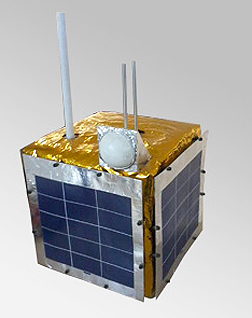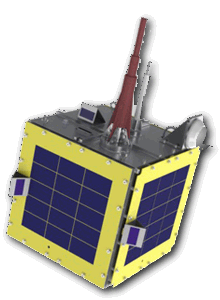SRM University Chennai

The SRMSAT is the first Nano Satellite of SRM University. It has been designed by students and faculties of SRM University. The design is made robust enough to support different payloads and act as a Nano Bus for further missions. By this process SRM University would be able to provide qualified and trained scientific and technological manpower in satellite technology.
SRMSAT was launched on 12 Oct 2011 from SDSC-SHAR by PSLV C-18 with Megha Tropiques.
NASA-Catalog: 37841
Downlink
437.425MHz, CW
Call
SRMVU
Orbital Parameter
NORAD 37841 COSPAR designator 2011-058-D Inclination 19.970 RA of A. Node 106.259 Eccentricity 0.0012093 Argument of Perigee 99.676 Revs per day 14.10196386 Period 1h 42m 06s (102.10 min) Semi-major axis 7 237 km Perigee x Apogee 850 x 867 km BStar (drag term) 0.000000000 1/ER Mean anomaly 260.509

Mission
- Provide hands on experience to the students and the faculty of SRM University
- Develop a 10Kg Satellite
- Monitor Greenhouse Gases
- Develop a „Nano Satellite Bus“ for future missions
Status
aktiv
Telemetrie
SRMVUCZZPXC Character 6: C – Normal Mode Character 7: Z – Detumbling Mode Character 8: GPS Status Character 9: Payload Status Character 10: X – 10 to 20 degree celcius Character 11: C – Less than 7 V
Character 6: Satellite Mode 1. P - Sensing Mode 2. X - Communication Mode 3. C - Normal Mode 4. Z - Detumbling Mode Character 7: Magnetometer Status 1. C - On 2. P - Off 3. X - Error 4. Z - Ready Character 8: GPS Status Character 9: Payload Status Character 10: Temperature Status 1. C - < 0 degree celcius 2. P - 0 to 10 degree celcius 3. X - 10 to 20 degree celcius 4. Z - 20 to 30 degree celcius 5. 6 - 30 to 40 degrees celcius 6. 4 - Above 40 degrees celcius Character 11: Battery Status 1. C - Less than 7 V 2. P - >7V and <7.3V 3. X - >7.3V and <7.6V 4. Z - >7.6V and <7.9V 5. 6 - >7.9V and <8.1V 6. 4 - >8.1V
 CW Bakensignal
CW Bakensignal